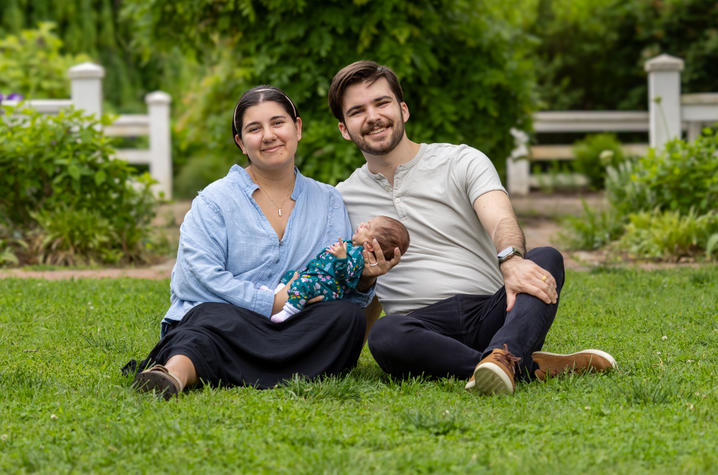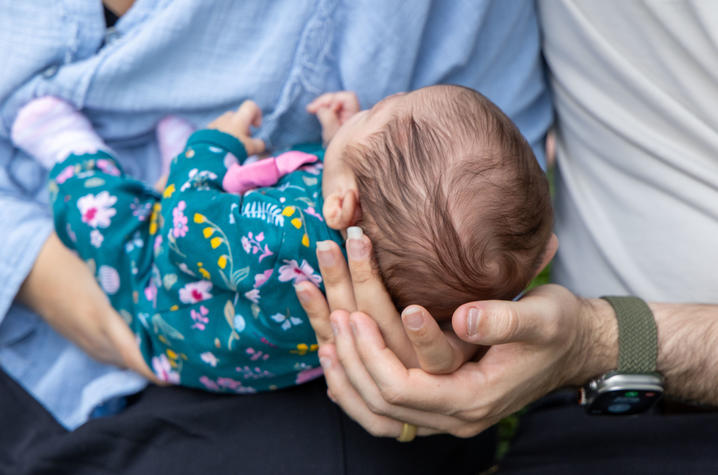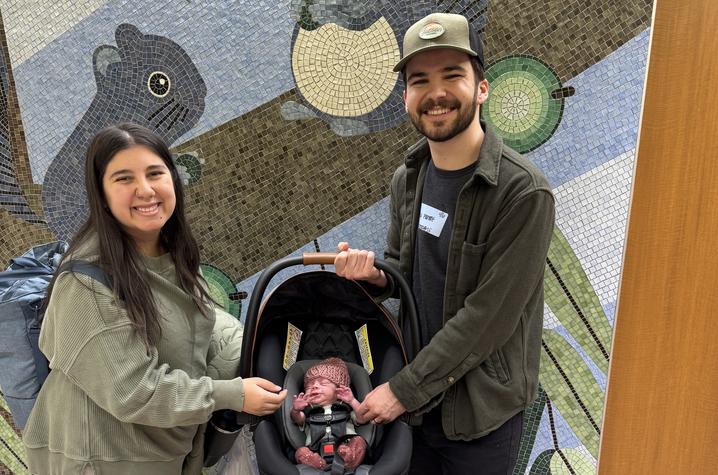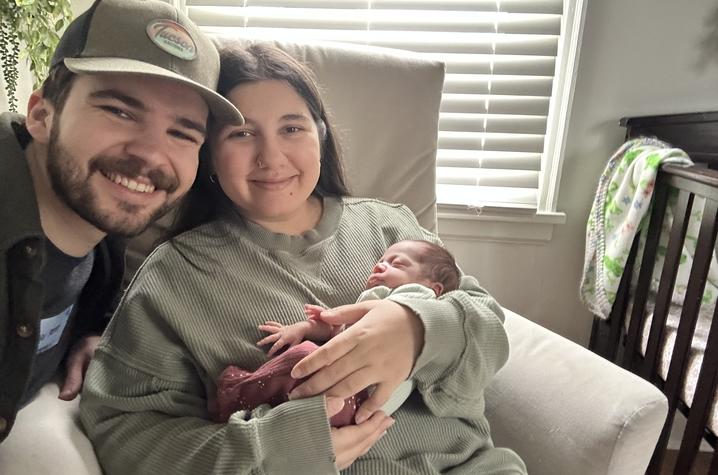Healing after heartbreak — mother and baby beat the odds together
LEXINGTON, Ky. (May 13, 2025) — Even though she didn’t know for sure, Roxanna Sexton of Lexington instinctively felt she was pregnant.
There was a feeling, one she couldn’t quite describe, but it stood in sharp contrast to the grief she’d carried after a miscarriage and the weight of depression. She tried to put the feeling out of her head, not wanting to get her hopes up after experiencing pregnancy loss once already.
Sexton has gone through seasons of depression, during which she relied on medication to keep her mind clear and mood stable. After experiencing some difficulty in getting her antidepressant medication, she visited the UK HealthCare EmPATH unit to consult with a provider and have her prescription filled. That nagging feeling was still in the back of her mind, so she asked for a pregnancy test.
“I was getting kind of anxious because it was taking a while,” she said. “But then the doctor pulled me aside and told me the good news.”
While it wasn’t the way she envisioned finding out, she and her husband, Titus, were thrilled. They had been trying to get pregnant for more than a year. They even had an appointment to meet with a fertility specialist later that month.
Still, the pain of her miscarriage clouded what should have been an exciting time.
“I was very hypervigilant about this pregnancy,” she said. “I just wanted to do everything the right way.”
She took leave from work and focused on her mental health. Even though her pregnancy was proceeding normally, she wouldn’t let herself get too excited. She put off decorating the nursery and delayed having a baby shower. Though initial scans showed a predisposition for preeclampsia, she was determined to do everything she could to provide a healthy space for her baby to grow.
About halfway through her pregnancy, she experienced some bleeding and went to University of Kentucky Albert B. Chandler Hospital, where tests revealed polyps on her cervix. On top of everything, now Sexton had to worry whether she had cervical cancer. Those tests came back negative, and even though the cause of the bleeding was never definitively determined, Sexton tried not to let the anxiety get to her.
“I just had to hold it all together — throughout my whole pregnancy, my emotions had to stay even,” she said. “I couldn’t get super stressed out or put myself in certain positions because I knew whatever the mom feels, the baby could feel. I was just constantly worried about having a miscarriage. I just had to suppress as much as I could and isolate myself.”
But not in a depressive way, Sexton pointed out; more as an act of self-preservation. That same intuition that she felt when she suspected she was pregnant was guiding her again, telling her to stay as calm as possible.
But Sexton’s body was at odds with her mind, sending new sources of stress to challenge that neutral demeanor. Her feet, face and arms were painfully swollen; elevating her feet did nothing to reduce the swelling. She had pain in her back, and her blood pressure was dangerously high. Even though she carefully followed her prenatal vitamin regimen and drank plenty of water, her symptoms became too much to dismiss as a normal part of pregnancy. With 10 weeks still to go, Sexton returned to UK Chandler Hospital.
Physicians determined that Sexton was experiencing preeclampsia, a serious pregnancy characterized by high blood pressure and protein in the urine. It typically develops after 20 weeks of pregnancy and can pose significant risks to both mother and baby. For the mother, it can lead to seizures, stroke or organ failure if left untreated. For the baby, restricted blood flow can limit growth and lead to premature birth or even stillbirth. The condition can escalate quickly, making early detection and close monitoring critical to protecting both lives. Early delivery is usually recommended if either mother or baby are in distress. However, delivering too early can lead to premature complications for the baby.
Although her baby’s vitals were normal, Sexton’s were not. Suddenly, her birth plan changed. Sexton had envisioned exactly how she wanted her labor and delivery to go. But now the plan was to get her blood pressure down and keep the baby in her womb as long as possible. When babies are born premature, their lungs are not fully developed, leading to potentially severe respiratory complications. But keeping the baby in there too long, when Sexton herself was struggling, could also lead to complications.
Her care team had a plan to manage Sexton’s symptoms and to keep her from delivering until she hit 37 weeks. Changes in her condition revised that plan to 34 weeks. Then, suddenly at 31 weeks and four days, the fetal monitors showed that the baby was in distress. Sexton’s care team told her it was time.
“They said, ‘This baby needs to come out,’” she said. “I said, ‘Do whatever you need to do.’ As soon as I heard she was in distress, I didn’t care about my body; my main concern was whether she was going to be ok. I was so scared because she was still so little.”
The medication made some of the salient details of her caesarian section a little foggy, but there is one memory that Sexton will treasure for the rest of her life. It was the moment where the weight of the fear, anxiety and stress of the last seven months instantly evaporated, and the relief was palpable.
“She came out crying,” she said. “That meant her lungs were really strong. She’s a strong baby, but I had always known that. But the moment she was out, my body was comforted and I could finally really rest and let my mind be a peace.”
On Feb. 27, two months before she was due, Mary Bear, aka “Bear” made her debut. She was strong, but not out of the woods just yet. At just 3 pounds, 12 ounces, she spent a week in the Kentucky Children’s Hospital neonatal intensive care unit (NICU) before being moved to a progressive care unit for a few more weeks. Sexton was there all day, every day. Each night, she and Titus would pray over their baby, knowing that divine intervention had protected their family, and would continue to keep everyone safe.
Sexton credits the support she got from staff in the NICU for helping her refine the skills she needed care for Bear at home, particularly the NICU’s lactation consultant, Tera Hunt.
“She was like an advocate for me at times too,” Sexton said. Hunt walked Sexton through the steps to help Bear get a good latch and how to breathe and swallow while feeding.
“Bear did a really good job. Tera would come even at times that I hadn’t requested for her, just to check on Bear and me,” Sexton said. “It was really sweet. I definitely think that Bear would not be as good as she is at breastfeeding if it wasn’t for Tera.”
After 38 days in the hospital, Bear finally got to come home. Sexton said Bear settled in immediately, growing and thriving in the absence of monitors and machinery. As with most premature babies, Bear will continue to need follow-up care. She has a small brain bleed that will need to be monitored, as well as a small hole in her heart called an atrial septal defect. Both could resolve on their own over time, but Bear will continue to be monitored with regular check-ins at the NICU Graduate Clinic.
In the meantime, now that the Sextons are settling into life as a family of three, she has some advice for new mothers whose vision for an uneventful pregnancy and delivery may not go exactly as planned.
“Support is just so important,” she said. “So many people reached out to me and asked how I was doing. Don’t feel bad if people offer you meals, you just need to let them. I really credit how well I’m doing postpartum to all the people who reached out. You have people who want to help, so use them. They love you.”
Sexton has big plans for this little baby. She herself was adopted from Romania at 11 months old, and she plans to take her daughter back there one day so they can both get to know their homeland. But for now, she finally got to celebrate her first Mother’s Day, while still mourning the years following her miscarriage when she couldn’t celebrate. She recalls an exercise with her therapist, in which she was encouraged to pick up a rock and transfer all the grief from her miscarriage into it.
“This rock would take our worries away,” she said. “I was able to put some closure on my miscarriage. I put everything into this rock and finally felt free. Not long after, I found out I was pregnant. It was really beautiful and cool.”
And now the day of maternal celebration and appreciation has come, and Sexton couldn’t be more excited and grateful to be able to celebrate with her baby Bear.
“When Mother’s Day came around, I was sad I couldn’t celebrate,” she said. “And now that have my child, it’s very exciting. I was soaking up the day and living in the moment.”
UK HealthCare is the hospitals and clinics of the University of Kentucky. But it is so much more. It is more than 10,000 dedicated health care professionals committed to providing advanced subspecialty care for the most critically injured and ill patients from the Commonwealth and beyond. It also is the home of the state’s only National Cancer Institute (NCI)-designated Comprehensive Cancer Center, a Level IV Neonatal Intensive Care Unit that cares for the tiniest and sickest newborns and the region’s only Level 1 trauma center.
As an academic research institution, we are continuously pursuing the next generation of cures, treatments, protocols and policies. Our discoveries have the potential to change what’s medically possible within our lifetimes. Our educators and thought leaders are transforming the health care landscape as our six health professions colleges teach the next generation of doctors, nurses, pharmacists and other health care professionals, spreading the highest standards of care. UK HealthCare is the power of advanced medicine committed to creating a healthier Kentucky, now and for generations to come.









